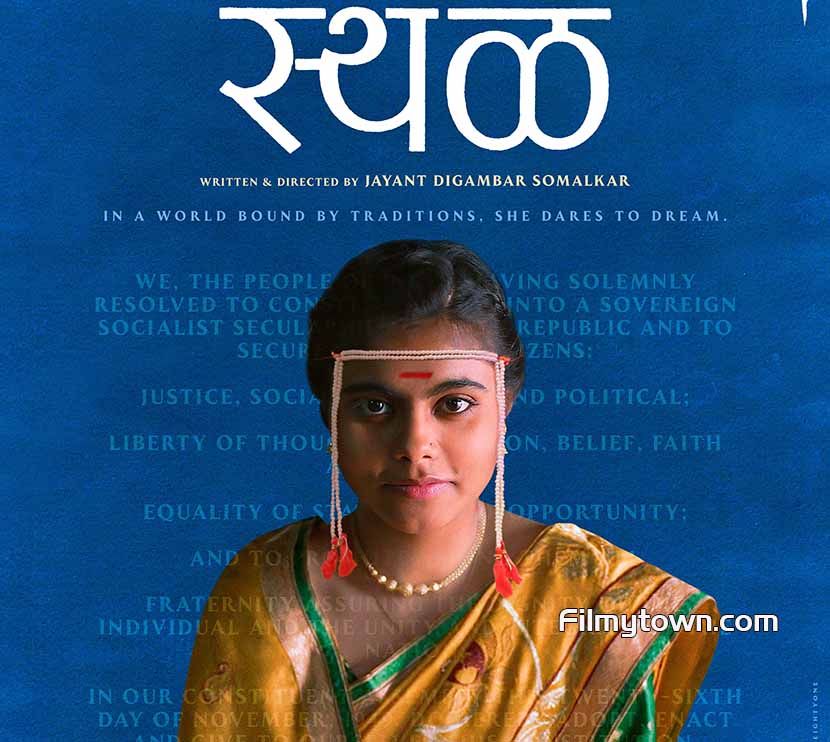Producer Shefali Bhushan feels it so appropriate to release Sthal on the eve of International Women’s Day, because in big and small ways the film questions patriarchy and celebrates womanhood.
Sachin Pilgaonkar, known for his illustrious career spanning over five decades as an actor, director, and singer in Hindi and Marathi cinema, is starting a new chapter this year. He is presenting the Marathi film ‘Sthal’, produced by Dhun Productions and written and directed by Jayant Digambar Somalkar. The film is set to release theatrically on March 7 to commemorate International Women’s Day.
Sthal (A Match) explores the tradition of arranged marriages in rural India, where the relentless pursuit of a girl’s marriage overshadows the very sustenance of life. It is narrated from the perspective of a young girl, Savita, highlighting patriarchy, colorism and social evil deeply rooted in society.
The debut feature of Jayant Digambar Somalkar, who previously co-wrote and co–directed the acclaimed web series ‘Guilty Minds’ premiered at the prestigious Toronto International Film Festival, where it won the NETPAC Award for the Best Asia Pacific Film. It has since been screened at 29 major film festivals and has garnered over 16 awards, creating a buzz in the film industry.
The film shot in Jayant’s native village, Dongargaon in the Chandrapur District of Maharashtra, features an ensemble cast of first-time actors from the village starring Nandini Chikte as the protagonist Savita along with Taranath Khiratkar, Sangita Sonekar, Suyog Dhawas, Sandip Somalkar, Sandip Parkhi, Swati Ulmale, Gauri Badki & Mansi Pawar.
Sachin Pilgaonkar, the presenter of ‘Sthal’ says, “Shriya (Pilgaonkar) first saw the film ‘Sthal’ at the MAMI Festival in Mumbai and insisted that we watch it too. I, along with my wife Supriya, saw it at the NAFA Film Festival in the U.S. Both of us loved the film. This film rooted in the rural culture of Maharashtra got such an overwhelming response even from the Marathi diaspora in America, that I immediately offered my support in every way to the director, Jayant . Later, when he along with the producers of ‘Sthal’ approached me to present the film, I immediately agreed. A great story deserves to reach its audience, and that’s why I decided to present this film”.
Excited about the theatrical release, the writer and director Jayant says, “It’s a moment of immense joy and pride for me to announce that Sthal, after its incredible journey across the globe, touching hearts and winning accolades, will finally grace theaters on 7th March, perfectly timed with International Women’s Day. For a filmmaker, there’s no greater dream than seeing their work come alive on the big screen and connect with audiences.”
Jayant adds, “Having the legendary Sachin Pilgaonkar support and present Sthal makes this journey even more special. Growing up, his films were a cherished part of my childhood, and to now have his name associated with my film feels like a full-circle moment and a deeply personal honor.”
The film is produced by Dhun, a production company co-founded by Karan Grover, Shefali Bhushan, Jayant Digambar Somalkar & Riga Malhotra.
In a village in the Vidarbha region of India, a determined young girl, Savita, yearns for education and a brighter future. However, as her farmer parents anxiously struggle to find a suitable match for her, societal expectations place immense pressure on her to prioritize marriage over personal aspirations. Being dark-complexioned and short in height, Savita is seen as an added ‘burden’ on her parents and ‘marrying her off’, as difficult as finding fair price for their crop. Facing countless rejections from potential suitors, she must navigate a world where the pursuit of marriage overshadows the very sustenance of life. Shot on real locations with real people from the village, all non-actors, ‘A Match’ is the director’s debut feature film that explores the tradition of arranged marriages in rural India while highlighting patriarchy, colorism and social evil deeply rooted in society.






